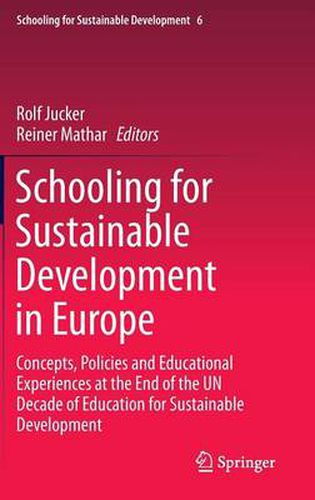Readings Newsletter
Become a Readings Member to make your shopping experience even easier.
Sign in or sign up for free!
You’re not far away from qualifying for FREE standard shipping within Australia
You’ve qualified for FREE standard shipping within Australia
The cart is loading…






This title is printed to order. This book may have been self-published. If so, we cannot guarantee the quality of the content. In the main most books will have gone through the editing process however some may not. We therefore suggest that you be aware of this before ordering this book. If in doubt check either the author or publisher’s details as we are unable to accept any returns unless they are faulty. Please contact us if you have any questions.
This book examines the implementation of Education for Sustainable Development (ESD) programs in schools across Europe. It describes and analyzes how individual countries and the region as a whole have established teaching and learning methods to help students develop the competencies needed to be part of a sustainable society.
Featuring chapters written by experts throughout Europe, the book first provides a general overview of ESD in various contexts, including the state-of-the-art of ESD theory and conceptual development; political and social analysis; the various concepts of ESD competencies; and teacher training. Next, the book details how ESD has been implemented in different European countries and regions, including: Sweden, Italy, Germany, Austria, Switzerland, Catalonia, Hungary, Finland, Norway, Denmark, Flanders, France, Cyprus, UK and the Netherlands.
In recognition of education as a motor of change, the United Nations General Assembly declared a Decade of Education for Sustainable Development (2005-2014), calling for the integration of sustainable development into all aspects of education and learning. Inside this book, readers will find details on what has been done, as well as assessments of what more could be done, across Europe. It will help readers gain valuable insights into how to help students develop the knowledge, skills and values needed to shape a sustainable future.
$9.00 standard shipping within Australia
FREE standard shipping within Australia for orders over $100.00
Express & International shipping calculated at checkout
This title is printed to order. This book may have been self-published. If so, we cannot guarantee the quality of the content. In the main most books will have gone through the editing process however some may not. We therefore suggest that you be aware of this before ordering this book. If in doubt check either the author or publisher’s details as we are unable to accept any returns unless they are faulty. Please contact us if you have any questions.
This book examines the implementation of Education for Sustainable Development (ESD) programs in schools across Europe. It describes and analyzes how individual countries and the region as a whole have established teaching and learning methods to help students develop the competencies needed to be part of a sustainable society.
Featuring chapters written by experts throughout Europe, the book first provides a general overview of ESD in various contexts, including the state-of-the-art of ESD theory and conceptual development; political and social analysis; the various concepts of ESD competencies; and teacher training. Next, the book details how ESD has been implemented in different European countries and regions, including: Sweden, Italy, Germany, Austria, Switzerland, Catalonia, Hungary, Finland, Norway, Denmark, Flanders, France, Cyprus, UK and the Netherlands.
In recognition of education as a motor of change, the United Nations General Assembly declared a Decade of Education for Sustainable Development (2005-2014), calling for the integration of sustainable development into all aspects of education and learning. Inside this book, readers will find details on what has been done, as well as assessments of what more could be done, across Europe. It will help readers gain valuable insights into how to help students develop the knowledge, skills and values needed to shape a sustainable future.